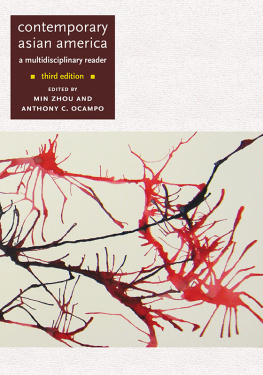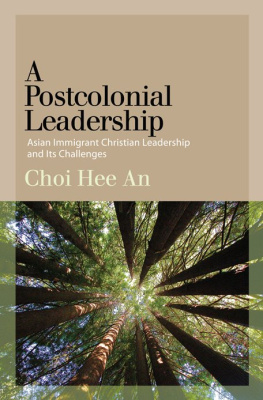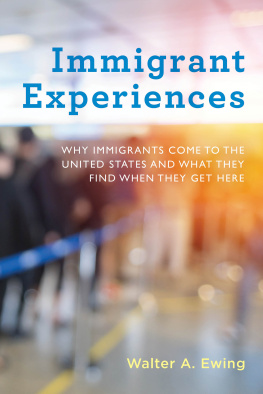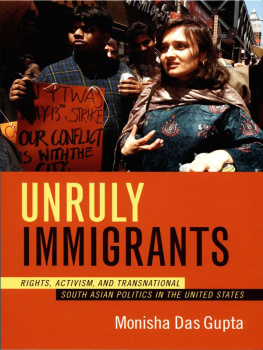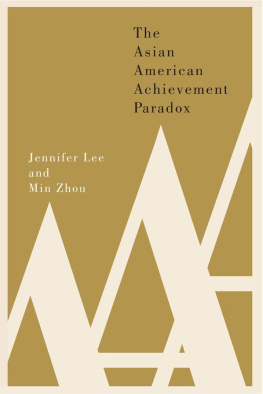A Postcolonial Relationship
A
Postcolonial
Relationship
Challenges of Asian Immigrants as the Third Other
Choi Hee An
Published by State University of New York Press, Albany
2022 State University of New York Press
All rights reserved
Printed in the United States of America
No part of this book may be used or reproduced in any manner whatsoever without written permission. No part of this book may be stored in a retrieval systemor transmitted in any form or by any means including electronic, electrostatic, magnetic tape, mechanical, photocopying, recording, or otherwise without the prior permission in writing of the publisher. For information, contact State University of New York Press, Albany, NY
www.sunypress.edu
Library of Congress Cataloging-in-Publication Data
Names: Choi, Hee An, author.
Title: A postcolonial relationship : challenges of Asian immigrants as the third other / Choi Hee An.
Description: Albany : State University of New York Press, [2022] | Includes bibliographical references and index.
Identifiers: LCCN 2021008190 | ISBN 9781438486574 (hardcover) | ISBN 9781438486581 (ebook)
Subjects: LCSH: Asian AmericansSocial conditions. | ImmigrantsUnited StatesSocial conditions. | Postcolonialism. | United StatesEthnic relations. | United StatesRace relations. | United StatesEmigration and immigration. | AsiaEmigration and immigration.
Classification: LCC E184.A75 C496 2021 | DDC 305.895/073dc23
LC record available at https://lccn.loc.gov/2021008190
10 9 8 7 6 5 4 3 2 1
For My Sisters,
Choi Jae Yeon () and Choi Kyoung Hwa ()
Contents
Acknowledgments
Relationship has been the most important core value that I cherish and care for in my life even though I get hurt and feel the pain quite often. As I run toward relationship, sometimes it hurts. As I run away from it, it always hurts more. At the same time, as I cherish it, I find happiness often. As I care for it, I find joy more often than not. I notice that forgiveness, reconciliation, and/or hospitality are required if relationships are to form and trust is to be built. As I go through the process of forgiveness and reconciliation inside and outside of me, I can see hope in people. As I receive and/or act upon hospitality, I feel God.
I want to thank my mother and father, who gave me the foundation of relationship, love, and trust. I want to thank my sisters, who showed me how the fragile and vulnerable could be the powerful by building solidarity and support. I want to thank my aunt, who demonstrated what persistence looked like in difficult relationships through hospitality. I deeply want to thank my late father-in-law and mother-in-law, who manifested the meaning of love in sacrifice and faith in unjust situations.
I want to thank my friends and mentors who listened to my lamentations and gave me great encouragement. I want to thank my colleagues and students at the Boston University School of Theology and the Anna Howard Shaw Center. I especially want to thank my beloved student Shaunesse Arielle Jacobs, who edited this book with great enthusiasm and support. I also want to thank my editor at the State University of New York Press, James Peltz, who recognized the value of this book with great confidence.
Lastly and mostly, I want to thank my husband, who criticized the first draft of this book mercilessly and inspired me to reinterpret the position of third otherness for Asian immigrants. Without his critical comments and insights and without his warm and kind encouragement, this book would never have come to light.
I want to thank God, who gave me wisdom and passion to reflect and write this book for the people who continuously and persistently care about building good relationships among us.
Introduction
When I talk about ethnic relations, I often hear words similar to these: We (whites) are privileged, and its at other peoples expense. We especially benefitted from slavery. Black people were forced to be here, unlike other immigrants who came to America voluntarily. For about two hundred years, they were forced to be slaves, brutally abused, and forced to build this country under free labor. Most other groups didnt have it anywhere near as bad, We (whites) have fought a lot and worked to give up our privilege to bring about justice and equality for everyone. How long do we have to be blamed for injustices? Im tired of hearing everyone elses complaints. Our situations arent perfect either, Dont ask us (blacks) to teach you what to do or how to be better. You need to figure it out for yourself. Study history and culture before you ask us for help. Were so tired of teaching people who dont make any effort to learn themselves, Now they (whites) always complain about experiencing reverse racism and are tired of hearing our complaints. I laugh. They have no idea what we (blacks) go through every single day, In this country everything is black and white. There is no room for us (Latinx). Were invisible. And if we arent invisible, were just illegal immigrants to them (whites). They ask us to work for next to nothing, then tell us to leave because were taking their jobs, Even though many of us (Asians) are here escaping colonial and postcolonial war and white imperialism, they say that we are here voluntarily and need to go back to our homelands. We arent allowed to stay. They always treat us as foreigners in this country. They say we dont belong to America, so we dont talk about racism. Its easier to stay out of it.
Although people hear these conversations in private domains within each ethnic group, these conversations are not seriously discussed cross-ethnically in the public domain. Even in private domains, people often feel uncomfortable or fearful of discussing racial relations with other ethnic groups. Some white elite liberal groups confess their colonial history and criticize white racism, whereas some conservative white groups express their feeling of reverse racism and confirm white supremacy. Both elite liberal and conservative white groups are concerned about their relationships with black groups, but in different manners. Some black groups try to teach the problems of white racism, whereas other black groups express their exhaustion from teaching others about white racism when there is no effort made by white groups. Both black groups give more attention to white domination and supremacy than other racial relations. Some Latinx groups observe that racism is not about racial discrimination against all racial minorities, but only white/black relations. Other Latinx groups are much more into immigration issues than racism issues. Some Asian groups want to stay out of racism issues because they believe they are white/black issues, whereas other Asian groups stay out of racism discussions because they feel ignored by both black and white groups. Both Latinx and Asian groups often feel that racism in U.S. society focuses on black/white relations only. They claim that black and white racism dominates all ethnic relations, and their voices are not heard.
Each ethnic group points to different standpoints when observing ethnic relations. However, their different standpoints are not acknowledged equally. The current construction of racial/ethnic relations is heavily built on the foundation of a black/white binary relationship. Various other racial relations are discussed selectively with different weight, with or without intentionality. This black/white relationship is often thrown into the talk of white/black racism, which is treated as a completely separate issue from Asian and Latinx racial issues. In fact, Asian and Latinx racial issues are often misunderstood as problems of immigration, not racism. The discussion of their issues in conversations around racism is not appreciated. In fact, they are not allowed to engage in black/white racism conversations. Rather, talking about racism among other racial groups is often misunderstood as a tool to dismiss the importance of black/white racism, especially as a tool to weaken the importance of African Americans suffering. Adding more racial problems that various groups bring to the table is seen as an act of jeopardizing and distracting from the weight of black/white racial conversations.




